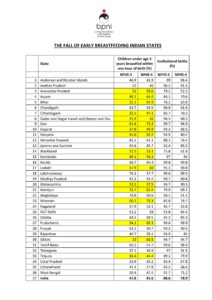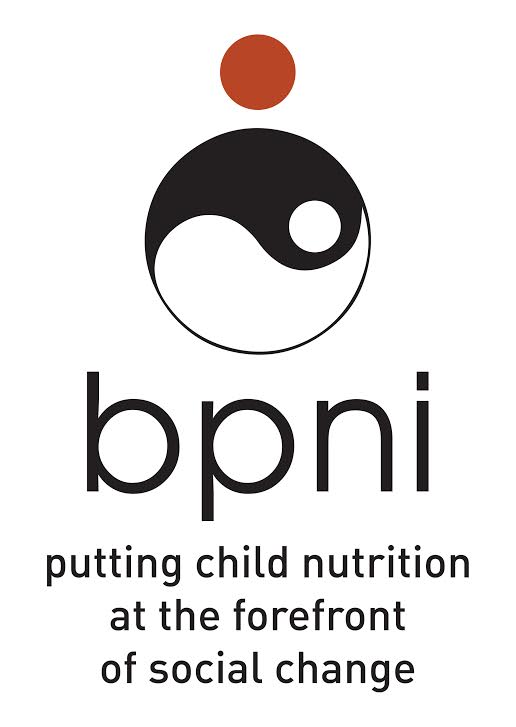Bridging the Gap in Early Breastfeeding Initiation in India: Early Breastfeeding within an hour is ~42% as against the births in health facility ~90%
 India has made significant strides in improving maternal and child health, reflected in the commendable 89% of births that now take place in health facilities. However, a critical gap remains in the early initiation of breastfeeding, with only 41% of newborns receiving breast milk within the first hour of life. This discrepancy is not just a statistic; it represents a missed opportunity to lay a strong foundation for a child’s health and development.
India has made significant strides in improving maternal and child health, reflected in the commendable 89% of births that now take place in health facilities. However, a critical gap remains in the early initiation of breastfeeding, with only 41% of newborns receiving breast milk within the first hour of life. This discrepancy is not just a statistic; it represents a missed opportunity to lay a strong foundation for a child’s health and development.
The first hour after birth, often referred to as the "golden hour," is crucial for both the mother and the newborn. During this time, skin-to-skin contact and early initiation of breastfeeding can significantly reduce neonatal mortality and improve long-term health outcomes. The Government of India has rightly prioritized institutional deliveries to ensure safer births. However, the benefits of facility-based deliveries will not be fully realized unless accompanied by immediate and sustained breastfeeding practices.
 The gap between institutional births and early breastfeeding rates signals a need for concerted action on several fronts:
The gap between institutional births and early breastfeeding rates signals a need for concerted action on several fronts:
Strengthening Implementation of the MAA Programme /Ten Steps to Successful Breastfeeding
The MAA programme and WHO’s Ten Steps to Successful Breastfeeding provides a proven framework to support early and exclusive breastfeeding in health facilities. These steps include skill training healthcare staff, ensuring skin-to-skin contact immediately after birth, and providing mothers with the support they need before and at time of birth to initiate breastfeeding. However, adherence to these steps in many Indian health facilities is inconsistent. It is imperative that we scale up the implementation of these guidelines across all health institutions, both in the public and private hospitals where the majority of births occur.
Enhancing Professional Lactation Services
India’s National Guidelines to establish lactation management centres has provision for skilled assistance from professional lactation counsellors . It is critical for supporting mothers before and during childbirth. The National Nutrition Policy had recognized the importance of such services, yet their availability is limited. To bridge this gap, there should be a concerted effort to expand access to professional lactation services across the country. BPNI can collaborate with the government to train and deploy lactation counsellors, ensuring that every mother receives the skilled support she needs to initiate breastfeeding successfully.
Involving the Private Sector-A key Strategy
The private sector plays a substantial role in healthcare delivery in India, yet it is not always obliged to follow government programs or guidelines. This gap presents a significant challenge, as many births occur in private facilities. It is essential to involve private maternity hospitals in the national efforts to promote early breastfeeding. This could be done through partnerships with professional associations. This can also be institutionalised to comply with the national guidelines for licensing. BPNI is prepared to work with the government and private sector to develop strategies that ensure these institutions are active participants in promoting early breastfeeding.
Implementing the IMS Act
The Infant Milk Substitutes, Feeding Bottles, and Infant Foods (Regulation of Production, Supply, and Distribution) Act 1992 and 2003 (IMS Act) is a vital piece of legislation aimed at protecting breastfeeding from commercial interests that promote formula feeding. However, the Act's implementation remains weak in many areas. To safeguard breastfeeding, it is essential to enforce the IMS Act rigorously and to take strategic actions against violations. BPNI is ready to support the government in monitoring compliance with the Act and in advancing its awareness among health workers.
Monitoring and Accountability
To bridge this gap, there needs to be a robust system for monitoring and accountability. This could include integrating early breastfeeding initiation indicators into existing maternal and child health programs within the hospitals. Along with regular program and process assessments and public reporting can be greatly helpful. BPNI can assist in developing and implementing these monitoring frameworks, ensuring that health facilities are held accountable for providing the necessary support to mothers.
Community Engagement and Education
Beyond the health facilities, it is crucial to educate families and communities about the importance of early breastfeeding. Social norms and cultural practices can often act as barriers to early breastfeeding, and community-based interventions are needed to change these perceptions. BPNI has a wealth of experience in community mobilization and can work alongside government initiatives to raise awareness and support behaviour change at the grassroots level.
Policy Support, Resource Allocation, and Maternity Protection
Achieving higher rates of early breastfeeding requires strong political will, adequate resources, and a commitment to maternity protection. Maternity protection should be overarching, extending beyond the immediate postpartum period to encompass workplace policies that support breastfeeding mothers. The government must prioritize early breastfeeding in its maternal and child health agenda, ensuring that sufficient resources are allocated to support training, monitoring, and community engagement efforts. BPNI stands ready to provide technical assistance and advocacy support to ensure that early breastfeeding remains a key focus of health policy in India.
In conclusion, the gap between institutional deliveries and early breastfeeding rates is a challenge that can and must be overcome. The benefits of closing this gap are immense—not just in terms of improved health outcomes for children but also in terms of reducing healthcare costs and building a healthier, more resilient population. BPNI is committed to working hand in hand with the Government of India and all relevant partners, including the private sector, to bridge this gap and ensure that every child in India receives the best possible start in life. Together, we can make early breastfeeding a reality for all newborns in India and eliminate the existing inequality.
Dr. Arun Gupta is a pediatrician, and Dr. Nupur Bidla is a social work professional both work for Breastfeeding Promotion Network of India (BPNI)

